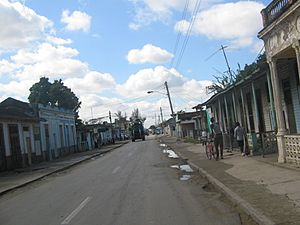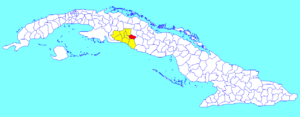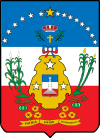Cruces, Cuba facts for kids
Quick facts for kids
Cruces
|
|||
|---|---|---|---|

The state road crossing the north of Cruces
|
|||
|
|||

Cruces municipality (red) within
Cienfuegos Province (yellow) and Cuba |
|||
| Country | Cuba | ||
| Province | Cienfuegos | ||
| Founded | 1852 | ||
| Area | |||
| • Total | 198 km2 (76 sq mi) | ||
| Elevation | 95 m (312 ft) | ||
| Population
(2022)
|
|||
| • Total | 28,977 | ||
| • Density | 146.3/km2 (379.0/sq mi) | ||
| Time zone | UTC-5 (EST) | ||
| Area code(s) | +53-432 | ||
| Website | https://cruces.gob.cu/ | ||
Cruces is a town and municipality in Cienfuegos Province, Cuba. It is well-known for the Mal Tiempo National Park. This park remembers an important battle from the 1895 War of Independence.
Contents
History of Cruces
The town of Cruces was started in 1852. It began in a place called Sabana de Ibarra. A railway was built nearby starting in 1848. This railway connected Cienfuegos and Villa Clara. The railway helped the town grow a lot. It reached Cruces in 1855.
In the past, there were five large sugar mills near Cruces. Their names were San Francisco, Andreita, Santa Catalina, Caracas, and Hormiguero. These mills were very important for the local economy.
The Battle of Mal Tiempo
Cruces is famous for the Battle of Mal Tiempo (which means "Bad Weather"). This battle happened during the Cuban War of Independence. Cuban rebels, called Mambises, fought against Spanish soldiers.
On December 15, 1895, the battle took place near Cruces. It happened in the sugar cane fields of the Mal Tiempo sugar mill. The Cuban rebels set the sugar cane fields on fire. Then, they bravely charged the Spanish soldiers with machetes.
The Cuban army reported that four of their soldiers died. About the same number were wounded. They said they caused about 200 injuries to the Spanish side. The Cuban forces also captured many weapons. They took 150 Mauser rifles and 60 Remington rifles. They also got ammunition, horses, and first aid supplies. They even captured the flags and papers of the Spanish forces.
The Mal Tiempo Monument and Park
In 1909, a monument was planned to mark the battle site. It was also meant to be a burial place for soldiers from both sides. The bodies of 79 Spanish and 7 Cuban soldiers were found. They were re-buried inside the monument's base. You could see them through a glass window.
The monument was finished in 1910. A park was built around it in 1950. In 1963, the monument was destroyed. But it was rebuilt in 1965 to look like the original. In 1978, it became a National Monument. The glass window was replaced with marble before it became a National Monument.
An important message is written on the rebuilt monument. It says: "En este histórico lugar, el 15 de diciembre de 1895 Nuestro ejército libertador al mando de los generales Antonio Maceo y Máximo Gómez, derrotó las fuerzas españolas en batalla decisiva demostrándose una vez más el arrojo, valentía y firmeza de nuestros heroicos mambises."Quien intente apoderarse de Cuba, recogerá el polvo de su suelo anegado en sangre, si no perece en la lucha" - Antonio Maceo
This means: "In this historic place on December 15, 1895, our liberating army, led by Generals Antonio Maceo and Máximo Gómez, defeated the Spanish forces in a decisive battle. This showed once again the courage, bravery, and strength of our heroic Mambises. 'Whoever tries to take over Cuba will cover its soil with their blood, if they do not die in the fight'." - Antonio Maceo
What Cruces Makes
The main industry in Cruces is making sugar. The Mal Tiempo sugar mill is still working today. It used to be called "Andreita." The Marta Abreu sugar mill, once called "San Francisco," is not active right now. It was put on hold by the Cuban government in 2002. This was part of a plan to change the country's sugar industry.
The Cruces area has different types of businesses. There are 2 Companies and 3 State Economic Organizations. It also has 6 Budged Units. For farming, there are 3 Agricultural Production Cooperatives. There are also 6 Cooperatives of Credits and Services. Plus, there are 5 Basic Units of Cooperative Production and 14 other businesses.
In the town, you can find the Marta Abreu pasta factory. There is also the Cubasol cookie factory.
Where is Cruces?
The municipality of Cruces is divided into smaller areas. These areas are called Estrada Palma, Mal Tiempo, Marta, and Monte Cristo. Cruces is located in the northwest part of the Cienfuegos province.
It shares borders with other places. To the north is Ranchuelo. To the south is Palmira. Cumanayagua is to the east. And Lajás is to the west. The Caonao River flows through the eastern part of Cruces. The land in Cruces is mostly flat. But there are some small hills, like the hills of La Rioja and Andreita.
People of Cruces
In 2022, about 28,977 people lived in the municipality of Cruces. The total area of Cruces is about 198 square kilometers (76 square miles). This means there are about 150 people living in each square kilometer.
Learning in Cruces
In the past, there were two Catholic schools and several public schools for younger students. One high school had about 800 students. For higher education, students would go to Cienfuegos or Santa Clara. Cienfuegos is about 11 miles (18 km) away. Santa Clara is about 28 miles (45 km) away.
Famous People from Cruces
- Martin Dihigo (1906-1971) was a famous Negro league baseball player. He was known as The Immortal. He is a member of the Baseball Hall of Fame in Cooperstown.
- José Abreu (born 1987) is also a well-known baseball player.
See also
 In Spanish: Cruces (Cuba) para niños
In Spanish: Cruces (Cuba) para niños
 | Ernest Everett Just |
 | Mary Jackson |
 | Emmett Chappelle |
 | Marie Maynard Daly |



